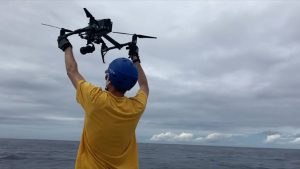NOAA permit 19703
The effects of climate change, human activities and prey availability on whales and dolphins are new areas of focus for the University of Hawaiʻi at Mānoa Marine Mammal Research Program (MMRP). Using non-invasive technology, such as drones and suction-cup tags, MMRP has already collected breathtaking footage and data on pods of humpback and gray whales at sea.
In 2016, humpback whales in Hawaiʻi were delisted from the Endangered Species List. However, since then, sighting rates of humpback whales in Hawaiian and southeast Alaskan waters have dropped. There’s currently a lack of understanding of why this is happening and the program, in collaboration with other research organizations, wants to understand possible causes of this apparent decline.
MMRP at the Hawaiʻi Institute of Marine Biology had traditionally been focused on acoustics-oriented research. Under new MMRP Director Lars Bejder, the research focus is expanding to include broader themes, many of which support conservation and management objectives. The overall mission of the program is the conservation of marine mammals.
“Marine mammals, they are charismatic animals and people really care about them,” said Bejder. “Some of the studies that we are carrying out will allow us to provide information to conserve these animals. Very importantly, they are also sentinels of ecosystem health and this is really important, because they can help raise concerns with the general public about concerns that we have about the ocean health today.”
MMRP research will seek to identify the specific effects of human activities on marine mammals, and the development of appropriate mitigation and management strategies. Research on cetacean population dynamics and behavior will involve efforts to estimate animal abundance at local and regional scales, assess changes in abundance over time and geographically and examine population connectivity. To best achieve its mission, the program will engage heavily across sectors including academic institutions, state and federal management agencies, industry, non-governmental organizations, community and educational organizations.
The program recently launched a new website and social media platforms (Twitter and Instagram: MMRP_UH, Facebook: MMRPUH, Youtube: MMRP UH) to build awareness. To help achieve its mission, the program is also accepting donations to fund research initiatives and student scholarships. All donations are tax-exempt.
Key collaborators include NOAA Fisheries; National Marine Sanctuaries; Alaska Whale Foundation; Aarhus University, Denmark; Laguna San Ignacio Ecosystem Science Program, Mexico; Pacific Whale Foundation; Murdoch University, Australia and UH Hilo.
—By Kelli Trifonovitch


